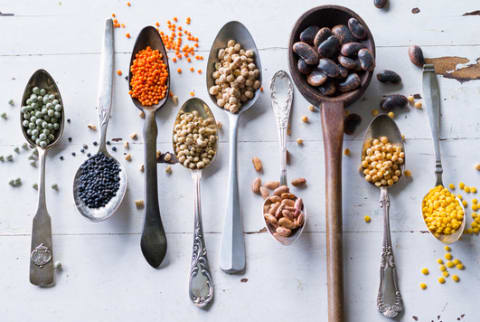Advertisement


A plant-based diet provides numerous benefits. They're typically lower in damaging fats but higher in fiber and other nutrients, which may explain why vegetarians and vegans have a lower risk for developing heart disease, some cancers, diabetes, obesity, and high blood pressure. Whatever your reason to stop eating animal foods (abysmal living conditions, inhumane treatment, rampant use of hormones and antibiotics, or other ethical and health concerns), I applaud your convictions.
That said, I sometimes encourage vegetarian and vegan clients to reintroduce lean animal protein. I see too many folks gorging on junk vegan foods, creating food intolerances, and making it harder to maintain a healthy weight. Many people actually do better with some animal protein in their diet. I love Dr. Mark Hyman’s "pegan" concept, skillfully juxtaposing the best qualities of vegan and Paleo diets. But if you refuse to compromise, employ these seven strategies to make the most of your vegan or vegetarian diet.
1. Optimize protein.
Legumes, nuts and seeds, nut butters, homemade veggie burgers, and plant-based (but not soy) powders make optimal protein sources. Combine ½ cup of lentils with ½ cup of quinoa and you’ll get 17 grams of protein. Aim for two or three higher-protein foods at every meal.
2. Upgrade your food.
Make healthier alternatives, or lateral shifts, for your faves. Swap nutrient-empty spaghetti noodles for corn-free quinoa pasta or spaghetti squash. Dump cow’s milk (you probably have anyway) for unsweetened coconut or almond milk. Cashew cheese smeared on portobello mushroom caps with tomato sauce becomes a decadent vegan pizza alternative. Be creative, and nearly any food can become a nutrient-denser lateral shift.
3. Watch for highly reactive foods.
Organic soy, eggs, and grass-fed dairy provide protein, healthy fat, and nutrients, yet over-relying on these and other potential food intolerances can create weight-loss resistance, inflammation, and miserable symptoms like fatigue, bloating, and headaches.
4. Address nutrient deficiencies.
Overall, I find vegans and vegetarians have lower nutrient levels. One study found that vegetarians often show deficiencies in vitamins B12 and D, omega-3 fatty acids, calcium, iron, and zinc. Dial up nutrient-denser foods and take a professional-quality multivitamin-mineral to cover nutrient bases you’re probably not getting from food.
5. Swap processed carbs for high-fiber starches.
Vegetarian- and vegan-friendly comfort foods often come loaded with preservatives, added sugars, and an overall carb load that tells your body to raise insulin and store fat. Skip the mac and vegan cheese and other meat-free Frankenfoods for nutrient-rich real foods like sweet potatoes, lentils and other legumes, and quinoa.
6. Beware of “healthy” sugars.
Agave, coconut sugar, and other sweeteners come cloaked with a health halo, but don’t be fooled: They create the same reactions as sugar, and sometimes worse ones. My one exception is locally grown organic raw honey for allergies and to strengthen your immune system. Even then, about up to a teaspoon a day will do the job.
7. Make an oil change.
Canola and other vegetable oils can ramp up inflammation and throw those valuable anti-inflammatory omega-3s out of balance. Upgrade your oils with coconut oil, red palm fruit oil, and extra-virgin olive oil. Healthy fats like avocado and slow-roasted or dehydrated almonds come loaded with nutrients and fiber, as well. Throw freshly ground flaxseed or chia seeds into your protein shake. I also recommend amping up those essential fatty acids with an algae-derived DHA supplement.
If you’re a vegan or vegetarian, what strategy would you add to optimize your diet? Do you agree that most people do well with some animal?

JJ Virgin, CNS, BCHN, is a celebrity nutrition and fitness expert who helps clients lose weight fast by breaking free from food intolerance. A certified nutrition specialist, board certified Holistic Nutritionist, and Certified Exercise Physiologist, she is the author of the New York Times best-sellers The Virgin Diet: Drop 7 Foods, Lose 7 Pounds, Just 7 Days and The Virgin Diet Cookbook: 150 Easy and Delicious Recipes to Lose Weight and Feel Better Fast.
More from the author:
Functional Nutrition Training
Check out Functional Nutrition Coaching
A cutting-edge nutrition deep dive taught by 20+ top health & wellness experts
Learn moreMore from the author:
Functional Nutrition Training
Check out Functional Nutrition Coaching
A cutting-edge nutrition deep dive taught by 20+ top health & wellness experts
Learn more
JJ Virgin, CNS, BCHN, is a celebrity nutrition and fitness expert who helps clients lose weight fast by breaking free from food intolerance. A certified nutrition specialist, board certified Holistic Nutritionist, and Certified Exercise Physiologist, she is the author of the New York Times best-sellers The Virgin Diet: Drop 7 Foods, Lose 7 Pounds, Just 7 Days and The Virgin Diet Cookbook: 150 Easy and Delicious Recipes to Lose Weight and Feel Better Fast.